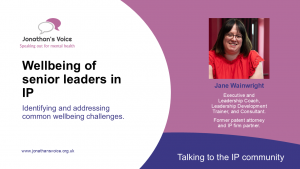To mark Stress Awareness Month, on 20 April 2023, together with IP Inclusive https://ipinclusive.org.uk/ Jonathan’s Voice held a webinar that looked at ways of opening a conversation about mental health and some of the key skills that might be helpful in supporting people to talk. And importantly, we looked at the question, once we are talking, what do we do next?
Our speakers were Professor Andrew Reeves, a Professor in Counselling Professions and Mental Health and a BACP Senior Registered Counsellor/Psychotherapist, and Mark Fudge, who has worked as a counsellor within higher education for 20 years and previously had a career in health development.
This webinar was a follow-up to our September 2022 webinar “Darkness to hope” to mark World Suicide Prevention Day.
A recording of the webinar is available at https://jonathansvoice.org.uk/media or read on for an excellent report of the webinar that was kindly written by Anne Burgato at IP Inclusive. Thank you very much Anne.
Anne writes
Andrew opened by saying that there is a lot of information available about starting conversations, but less attention is given to how to follow up. To start us off, Mark asked us to think about a time when we had asked for help. What was it like? What helped? What didn’t help? We found that just saying things out loud can be helpful, that being listened to without judgement helped, and platitudes were rarely useful.
Andrew expanded upon this by looking at the intrapersonal and interpersonal conversations we might have. Intrapersonal refers to the conversations we have with ourselves, so looking at our past experiences of helping, considering what was useful or not, considering why we are helping someone and what we are bringing to the discussion. By being aware of what is going on inside ourselves, we can improve our empathetic and non-judgemental helping. Helping is a dialogic process and we bring something of ourselves to it. By being aware of it we can use it to our helping advantage.
Interpersonal conversations are the conversations we have with others, and we looked at how the level of the relationship – whether the person is a family member, friend, colleague or stranger – will affect how the conversation goes and how it continues after that initial stage. It is important to open the door to connection and leave it open if the other person is not yet ready to talk. When listening, you should communicate that you are listening with non-verbal cues such as nods and smiles, or verbal cues such as summarising and reflecting what they have said. Show you are paying attention by asking questions, and always make clear you are keeping the door open to take it further when they are ready.
Andrew highlighted some red flags to watch out for when helping someone that could lead to problems for you and/or them. The first was “You are the only person I can talk to”. This can lead to you and them becoming isolated, it places a potentially huge burden on you, and it may not be the best solution for the person needing help if you are not the right person to help them. The second red flag is “This must always be confidential” as you should not make a promise that you may ultimately have to break to ensure everybody’s safety.
It is important to remember that the ultimate aim is not for you to solve the other person’s problem. You might signpost useful information for them to use or discard as they see fit, and just letting them feel heard, accepted, not judged and treated with kindness may be enough. Do not take it personally if they do not want to be helped, just make sure they know that your door is open for future conversations.
There are three core conditions for every helping relationship:
- Transparency and honesty.
- Empathy not identifying – stay in the other person’s shoes and resist the urge to make analogies with your own experience.
- Not making judgements – having unconditional positive regard for the other.
Summary
Understand the context of the helping relationship. Look at how you are helping, and who you are helping.
Reflect on the intrapersonal conversation. What are your drivers, what has helped you, what has not helped?
In the interpersonal conversation don’t isolate yourself. Don’t guarantee confidentiality. Don’t limit the other person’s options by being their only help. Don’t solve the problem. Listen in an active way.
Remember the three core conditions of a helping relationship: transparency and honesty, empathy not identifying, and not making judgements.









